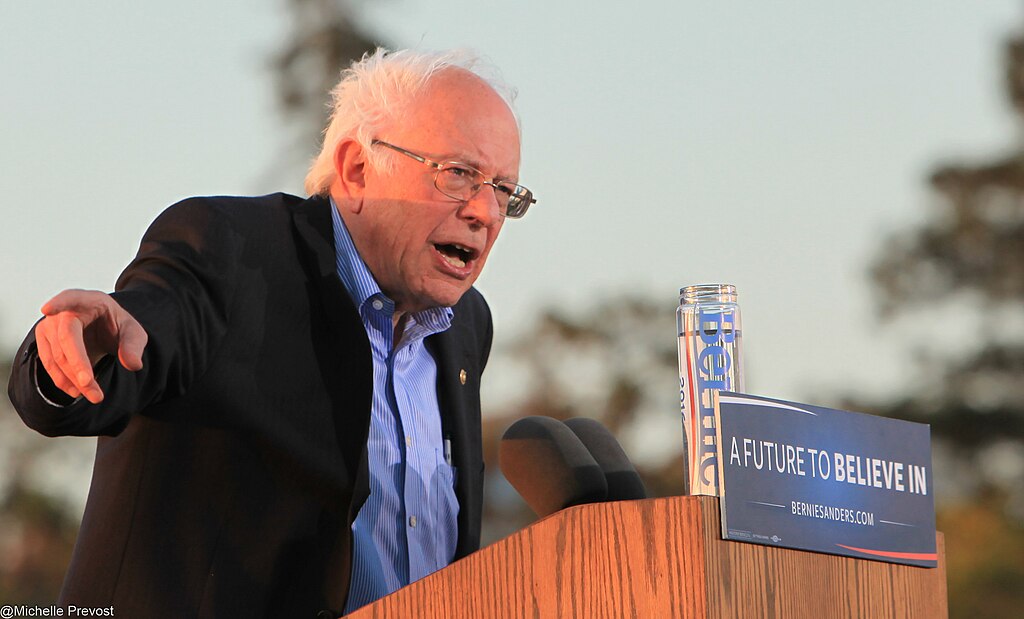In a surprising move, Senator Bernie Sanders announced plans to introduce legislation aimed at capping credit card interest rates at 10%, a promise once championed by former President Donald Trump during his campaign. Sanders, known for his progressive economic policies, argues that the bill would deliver immediate relief to millions of Americans burdened by high-interest debt.
The announcement is already stirring debate in Washington, with supporters praising the move as a step toward financial equity, while critics question its feasibility and potential economic impact.
Legislation Targets Soaring Interest Rates
Sanders’ proposal seeks to combat the rising interest rates that have plagued American consumers in recent years. Credit card interest rates currently average 20.5%, a record high, according to the Federal Reserve. For families already struggling with inflation and stagnant wages, high-interest debt has become a significant financial burden.
“Americans should not have to choose between putting food on the table and paying exorbitant interest on their credit cards,” Sanders said in a statement. He noted that the legislation would also introduce penalties for financial institutions that fail to comply with the cap.
The bill’s connection to Trump’s 2016 campaign pledge adds an intriguing political twist. Although Trump frequently touted the idea of capping credit card rates, it was never pursued during his administration. By aligning his proposal with Trump’s unfulfilled promise, Sanders appears to be challenging the Republican Party to act on behalf of working-class Americans.
Critics Voice Concerns Over Economic Impact
While Sanders’ proposal has garnered praise from consumer advocates, it faces significant pushback from financial institutions and conservative lawmakers. Critics argue that a 10% cap could lead to unintended consequences, including reduced access to credit for low-income borrowers and a potential tightening of the lending market.
The American Bankers Association warned that the legislation could “disrupt the financial system” and lead to higher fees for other banking services. Republican Senator Pat Toomey dismissed the proposal as “populist pandering,” claiming it would create more problems than it solves.
Despite these concerns, Sanders is pushing forward, emphasizing the need for bipartisan support. “This isn’t about left or right. It’s about doing what’s right for the American people,” he said.
Netizens Weigh In on Sanders’ Bold Proposal
The proposal quickly gained traction on social media, with users sharing their thoughts on Sanders’ legislative push. Twitter user @DebtFreeDreamer applauded the move, writing, “Finally, someone is standing up to the banks! This is the kind of change we need.”
Others expressed skepticism. User @FiscalRealist tweeted, “Sounds great on paper, but what happens when banks start denying credit to the people who need it most?”
Many users saw the move as a direct challenge to Trump. @PoliticalPundit posted, “Bernie is calling Trump’s bluff. Let’s see if the GOP stands by their campaign promises.”
Some, however, highlighted potential flaws. User @CreditHawk noted, “Capping rates at 10% could hurt smaller credit unions that rely on interest income to survive.”
Supporters remained hopeful. @JusticeForAll commented, “If this passes, it’ll change lives. Fingers crossed Congress does the right thing.”
Critics of Sanders continued to share their doubts. @EconomicsPro added, “Legislation like this sounds good but often leads to more harm than good in the long run.”
What’s Next for Sanders’ Legislation
The bill is set to be introduced next week, with Sanders planning to rally support among progressive Democrats and moderate Republicans. While its passage remains uncertain, the legislation has already reignited debates over consumer rights and financial fairness in America.



 Pentagon Ends Military Education Programs With Harvard University
Pentagon Ends Military Education Programs With Harvard University  TrumpRx Website Launches to Offer Discounted Prescription Drugs for Cash-Paying Americans
TrumpRx Website Launches to Offer Discounted Prescription Drugs for Cash-Paying Americans  Trump Backs Nexstar–Tegna Merger Amid Shifting U.S. Media Landscape
Trump Backs Nexstar–Tegna Merger Amid Shifting U.S. Media Landscape  U.S. Lawmakers to Review Unredacted Jeffrey Epstein DOJ Files Starting Monday
U.S. Lawmakers to Review Unredacted Jeffrey Epstein DOJ Files Starting Monday  TrumpRx.gov Highlights GLP-1 Drug Discounts but Offers Limited Savings for Most Americans
TrumpRx.gov Highlights GLP-1 Drug Discounts but Offers Limited Savings for Most Americans  Iran–U.S. Nuclear Talks in Oman Face Major Hurdles Amid Rising Regional Tensions
Iran–U.S. Nuclear Talks in Oman Face Major Hurdles Amid Rising Regional Tensions  Norway Opens Corruption Probe Into Former PM and Nobel Committee Chair Thorbjoern Jagland Over Epstein Links
Norway Opens Corruption Probe Into Former PM and Nobel Committee Chair Thorbjoern Jagland Over Epstein Links  Ohio Man Indicted for Alleged Threat Against Vice President JD Vance, Faces Additional Federal Charges
Ohio Man Indicted for Alleged Threat Against Vice President JD Vance, Faces Additional Federal Charges  New York Legalizes Medical Aid in Dying for Terminally Ill Patients
New York Legalizes Medical Aid in Dying for Terminally Ill Patients  China Warns US Arms Sales to Taiwan Could Disrupt Trump’s Planned Visit
China Warns US Arms Sales to Taiwan Could Disrupt Trump’s Planned Visit  U.S.-India Trade Framework Signals Major Shift in Tariffs, Energy, and Supply Chains
U.S.-India Trade Framework Signals Major Shift in Tariffs, Energy, and Supply Chains  Netanyahu to Meet Trump in Washington as Iran Nuclear Talks Intensify
Netanyahu to Meet Trump in Washington as Iran Nuclear Talks Intensify  Jack Lang Resigns as Head of Arab World Institute Amid Epstein Controversy
Jack Lang Resigns as Head of Arab World Institute Amid Epstein Controversy  Trump Allows Commercial Fishing in Protected New England Waters
Trump Allows Commercial Fishing in Protected New England Waters  South Korea Assures U.S. on Trade Deal Commitments Amid Tariff Concerns
South Korea Assures U.S. on Trade Deal Commitments Amid Tariff Concerns  Missouri Judge Dismisses Lawsuit Challenging Starbucks’ Diversity and Inclusion Policies
Missouri Judge Dismisses Lawsuit Challenging Starbucks’ Diversity and Inclusion Policies  Trump Endorses Japan’s Sanae Takaichi Ahead of Crucial Election Amid Market and China Tensions
Trump Endorses Japan’s Sanae Takaichi Ahead of Crucial Election Amid Market and China Tensions 































